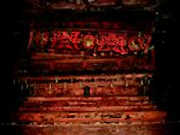 Aristocrat "Reborn" on Computer Screen
Aristocrat "Reborn" on Computer Screen
The material data unearthed from the tomb, including clothing, the headdress, earrings and necklace, help supply rare and accurate information in the restoration of the skeleton. An electronic image was reconstructed, defining the corpse's long face, short and narrow forehead, small, narrow eyes, thin lips, prominent cheekbones and flat nose.
 The aristocrat wore a headdress with two tiny braids decorated with some golden chips, a bowknot coiled at the rear of the head, earrings with beryl studs and an agate necklace.
The aristocrat wore a headdress with two tiny braids decorated with some golden chips, a bowknot coiled at the rear of the head, earrings with beryl studs and an agate necklace.
Research shows that the aristocrat was 1.6 meters tall and 30-35 years of age. It is still difficult for archeologists to accurately detect the sex of the subject -- even with the computer-generated portrait. This is the first time Chinese scientists had carried out physical anthropology and DNA testing on an ancient Khitan. The testing is currently still underway.
 Significance
Significance
Archaeologists say that the tomb had not been pillaged and that the relics are of great significance, offering a rich variety of materials for researchers delving into the history, social customs, costumes, arts and burial rites of the Khitans, as well as the exchanges between the early Liao and late Tang dynasties (618-907).
